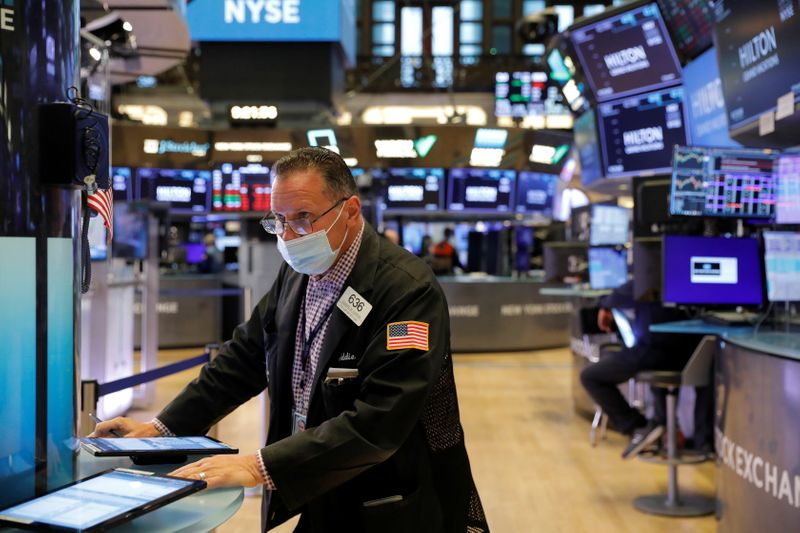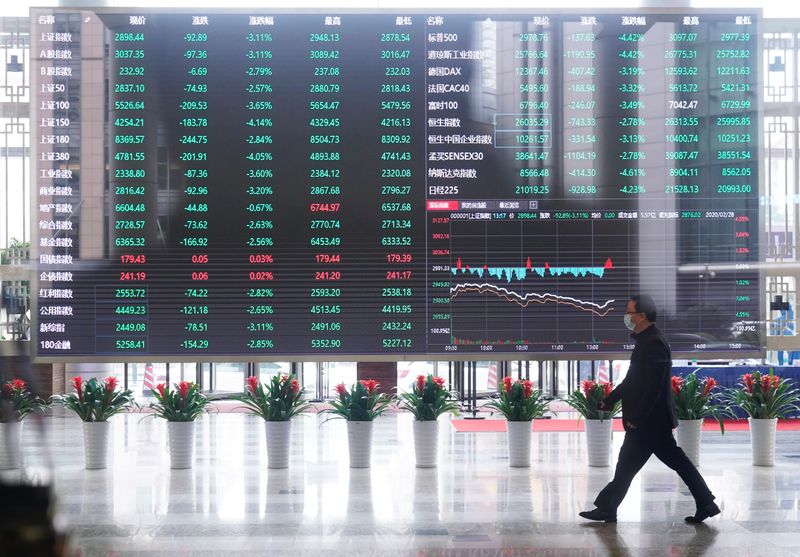By Herbert Lash and Marc Jones
NEW YORK/LONDON (Reuters) -Record-setting world stocks moved higher on Thursday after jobless claims data suggested the U.S. labor market was charging ahead even as new COVID-19 infections surge, while the risk of a upcoming sub-par U.S. payrolls report weighed on the dollar.
Economic data from Asia and Europe was largely disappointing but the Labor Department report showed the number of Americans filing new claims for jobless benefits fell last week to a pandemic-era low.
The decline in layoffs to their lowest in more than 24 years helped ease concerns about the state of the U.S. economy even if the closely watched employment report for August on Friday shows a slowdown in nonfarm payrolls growth.
"Right now the economic data is headed in the right direction," said Ed Moya, senior market analyst at foreign exchange brokerage OANDA. "There's strong optimism the Delta variant is not going to disrupt the economy - at least not as we saw the economy disrupted before."
MSCI's all-country world index ended the session at its fifth consecutive closing high, while the S&P 500 and Nasdaq also set new closing highs.
Energy-led value, up about 0.63%, outpaced a 0.03% gain in growth as Facebook (NASDAQ:FB), Google parent Alphabet (NASDAQ:GOOGL) and Amazon.com (NASDAQ:AMZN) fell, the latest twist in the ever-changing market leadership.
"We don't really have anything that you can hang your hat on and say this is where we're going, this is the sector that I need to be involved in," said JJ Kinahan, chief market strategist at TD Ameritrade.
"You're going to continue to see this back-and-forth type of trade," he said.
MSCI's world stock index, which measures equity performance in 50 countries , closed up 0.28% at 745.72. In Europe, the broad STOXX 600 index gained 0.31%.
On Wall Street, the Dow Jones Industrial Average rose 0.37%, the S&P 500 added 0.28% and the Nasdaq Composite advanced 0.14%.
Overnight in Asia, uncertainty over still-low vaccination rates in many economies and China's zero-tolerance COVID-19 strategy kept Chinese blue-chips flat, though speculation about more fiscal stimulus offered some support. (G)
MSCI's broadest index of Asia-Pacific shares outside Japan rose 0.16%. Japan's Nikkei added 0.3%, South Korea fell 1%, whereas Hong Kong's battered tech index enjoyed a fourth day of unbroken gains.
The euro traded near a one-month high versus the greenback after German central bank chief Jens Weidmann cautioned against inflation risks and urged slowing the European Central Bank's bond buying.
Also on Wednesday, ECB President Christine Lagarde said the euro zone economy was recovering and only needed "surgical" support targeted at sectors that still struggle.
The euro rose 0.30% to $1.1873.
The hawkish comments were in contrast to the Bank of Japan, which has shown no sign of tapering its massive purchases as the economy remains mired in a decades-long battle with deflation.
The dollar index, which tracks the greenback versus a basket of six currencies, fell 0.29% to 92.221. The yen last traded down 0.024% at $109.9500.
U.S. Treasury yields drifted lower as the market remained on hold ahead of the government's closely watched employment data on Friday, which could break yields out of a tight range.
The benchmark 10-year yield fell 1.3 basis points to yield 1.2886%.
Aluminium prices rose to a 10-year high on growing concerns that restrictions on Chinese production of the metal are causing supply shortages.
Oil rose more than $1, supported by optimism about the pace of the economic recovery from the pandemic, a sharp decline in U.S. crude stocks and a weaker dollar.

Brent crude settled up $1.44 at $73.03 a barrel. U.S. crude rose $1.40 to settle at $69.99 a barrel.
U.S. gold futures settled down 0.3% at $1,811.50 an ounce.
